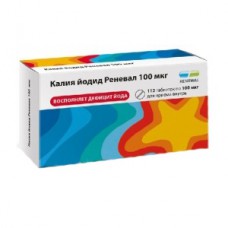Expiration date: 02/2026
Dosage form
pills
Composition
1 tablet contains:
potassium iodide 131 mcg
including iodine 100 mcg
Pharmacological action
Medium containing inorganic iodine. Upon receipt of the iodide in the cells of the epithelium of the follicle of the thyroid gland under the influence of the enzyme iodide peroxidase the oxidation of iodine to form elemental iodine, which is included in the molecule of tyrosine. Thus one part of the radicals of tyrosine in thyroglobulin lodiroad. Iodinated tyrosine radicals in congenerous tyranny, the main ones are thyroxine (T4) and triiodothyronine (T3). The resulting complex tironina and thyroglobulin stands out as deposited form of thyroid hormone in the colloid of the follicle and remains in this state for several days or weeks. When iodine deficiency, this process breaks down. Potassium iodide, offsetting the deficit of iodine, promotes the restoration of the synthesis of thyroid hormones.
With normal content of iodine in the environment under the influence of an excess of iodide inhibited the biosynthesis of thyroid hormones, their release of thyroglobulin, reduces the sensitivity of the thyroid gland to thyrotropic hormone of the pituitary gland and blocks its secretion by the pituitary gland.
Pharmacokinetics
If ingestion is rapidly absorbed from the gastrointestinal tract. Widely distributed in all tissues and liquid environments organism.
Side effects
Symptoms of iodism: swelling of the nasal mucosa, urticaria, angioedema, eosinophilia, shock; it is also possible tachycardia, irritability, sleep disturbances, sweating, diarrhea (in patients older than 40 years); in some cases, when used in doses exceeding 300-1000 mg/day, may develop hyperthyroidism (especially in elderly patients, the presence of nodular or diffuse toxic goiter); in high-dose therapy (more than 1 mg/day) may develop iodine-induced goiter and, consequently, hypothyroidism.
Special conditions
During therapy in patients with renal insufficiency may develop hyperkalemia
Testimony
Prevention and treatment of endemic goiter. Prevention of recurrence of goitre during the complex treatment of preparations of thyroid hormones.
Contraindications
Pronounced hyperthyroidism, latent hyperthyroidism (when used in doses exceeding 150 mg/day), toxic adenoma, nodular or diffuse toxic goiter (when used in doses of 300-1000 mg/day), dermatitis herpetiformis (Duhring's disease), pregnancy and breastfeeding (when used in doses of 1-2 mg/day), increased sensitivity to iodine preparations.
Application of pregnancy and breastfeeding
If pregnant, use only in recommended doses, because the iodine crosses the placental barrier and may cause hypothyroidism and goitre in the foetus.
Iodine is excreted in breast milk. In the application of the mother during lactation (breast-feeding) at doses over 1 mg/day raises the risk of developing hypothyroidism in the infant.
Application for violations of renal function
During therapy in patients with renal insufficiency may develop hyperkalemia.
Drug interactions
Simultaneous high-dose therapy with iodine and potassium-sparing diuretics may develop hyperkalemia with lithium preparations - the development of goiter and hypothyroidism. Perchlorate and tiozionat competitively inhibit the uptake of iodine by the thyroid gland, TSH stimulates.
Antithyroid drugs weaken effect (mutually).
Dosage
Individual. Daily dose based on the iodine is for children 50-100 µg for adolescents and adults - 100-200 mg.


